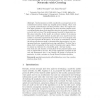Free Online Productivity Tools
i2Speak
i2Symbol
i2OCR
iTex2Img
iWeb2Print
iWeb2Shot
i2Type
iPdf2Split
iPdf2Merge
i2Bopomofo
i2Arabic
i2Style
i2Image
i2PDF
iLatex2Rtf
Sci2ools
130
click to vote
DCOSS
2010
Springer
2010
Springer
Self-stabilizing Synchronization in Mobile Sensor Networks with Covering
Synchronization is widely considered as an important service in distributed systems which may simplify protocol design. Phase clock is a general synchronization tool that provides a form of a logical time. This paper presents a self-stabilizing (one that tolerates transient statecorrupting faults) phase clock algorithm suited to the model of population protocols with covering. This model proposed recently for large-scale mobile sensor networks. In the model, an unknown number of anonymous finite-state mobile agents interact in pairs and in an asynchronous way subject to constraints expressed in terms of the cover times of agents. The cover time expresses the"frequency" of an agent to communicate with all the others and abstracts agent's communication characteristics (e.g. moving speed/patterns, transmitting/receiving capabilities). We show that a phase clock is impossible in the model of constant-state agents. Hence, we assume an existence of a resourceful agent - the ba...
Cover Time | DCOSS 2010 | Distributed And Parallel Computing | Phase Clock | Phase Clock Algorithm |
Related Content
| Added | 06 Dec 2010 |
| Updated | 06 Dec 2010 |
| Type | Conference |
| Year | 2010 |
| Where | DCOSS |
| Authors | Joffroy Beauquier, Janna Burman |
Comments (0)

